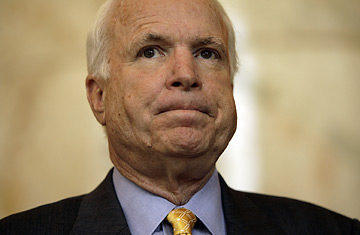
John McCain
Faced with disappointing second quarter fundraising returns — and with just $2 million cash on hand — the presidential campaign of John McCain limps on, but the one-time frontrunner faces enormous odds of winning the nomination that was once thought to be his for the taking.
In order to stay in the race, the McCain camp cut dozens of staff positions on Monday while many senior staffers took pay cuts. Perhaps the deepest sign of trouble is that McCain is giving serious consideration to accepting federal matching funds. Federal cash would keep the campaign functioning through the beginning of primary season, but it would also force McCain to abide by strict spending limits — limits that hobble none of the other major candidates. "When you're dying, you often need a transfusion," said University of Virginia political analyst Larry Sabato, "This is a transfusion of cash, not blood, but the campaign is dying."
In a conference call with reporters, campaign manager Terry Nelson and senior adviser John Weaver insisted that a combination of massive staff and salary cuts and a renewed focus on face-to-face "retail" politics could pave the way for an upset in early primary states. On the call, Nelson admitted that, "at one point, we believed we'd raise over $100 million in this calendar year," before dryly adding, "we now believe that assumption was incorrect."
To understand just how much has changed for McCain, one need only look back a little over a year ago, when national polls had McCain and former New York City mayor Rudy Giuliani neck-and-neck at the front of the GOP field. The McCain campaign planned its strategy accordingly, hiring former Bush staffers and focusing on winning a general election, not fighting out a competitive primary season.
Accepting the $6 million they have coming in matching funds, said one aide not on the call, would be a sign that McCain is not backing out anytime soon: "We're in the game; it will allow us to compete." Specifically, said the aide, the matching funds would allow McCain to pitch a media battle against the other Republican hopefuls. At the moment, Mitt Romney has aired an almost uncontested commercial blitz.
With an emphasis on early states and increased voter contact, advisers hope the campaign might begin to resemble McCain's widely admired insurgent run for the White House in 2000 — not that anyone expects a repeat. "It can never be 2000 again," said one staffer. One significant reason is that the McCain camp feels it has lost the good will of the national press corps. By focusing their attention on Iowa, New Hampshire and South Carolina, the campaign expects not only to highlight the senator's stump skills with voters, but showcase them to regional, rather than national, reporters.
The shift in tactics is also designed to make the most of the two resources the Arizona senator has in abundance — name recognition and charisma. "We've just got to get him out there," said top aide Mark Salter. "He's the best retail candidate in the bunch, and this is going to be" — a rueful laugh — "a heavily retail campaign."
Consultants aligned with rival campaigns were loath to pound nails into McCain's coffin, saying that the national media counted out Bob Dole and John Kerry early on in their campaigns and both went on to earn their parties' nominations. But while there's precedent for coming from behind to win, there's almost none for leading the race, falling to the back of the pack and surging ahead again. "Very occasionally, a weak campaign will get stronger," says Sabato. "But they never get strong enough to win."
